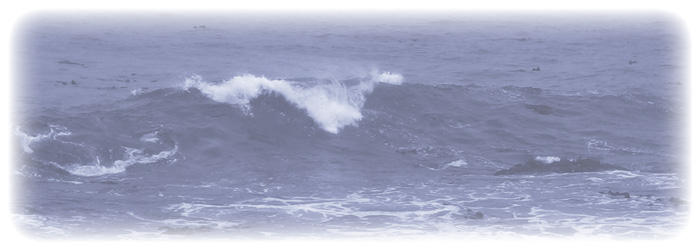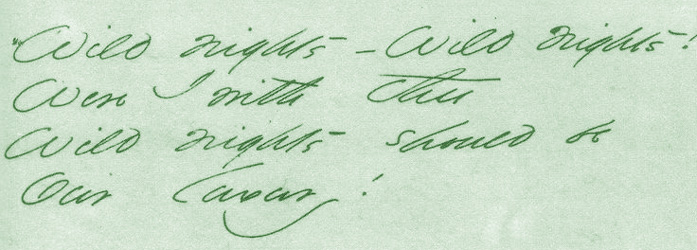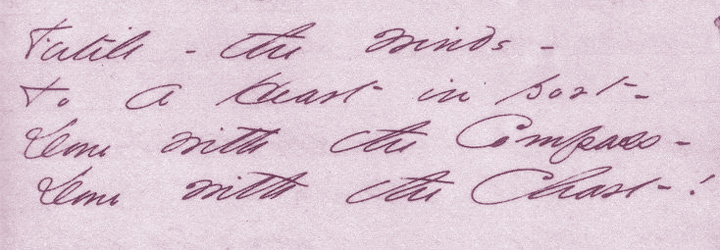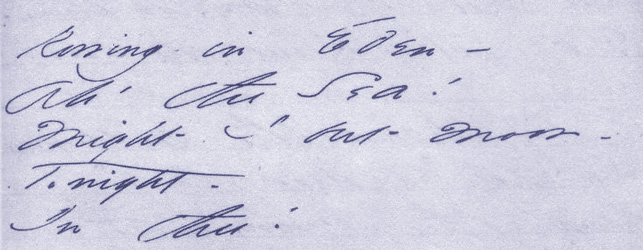Here is the best Wild Nights—Wild Nights analysis you will find anywhere. First, we will do a line by line analysis of Wild Nights—Wild Nights, then we will offer three different interpretations. Please enjoy our analysis of this famous Emily Dickinson poem!

Wild Nights—Wild Nights analysis, which version?
Any Wild Nights—Wild Nights analysis would be incomplete without first addressing this issue. There are different versions of the poem Wild Nights—Wild Nights by Emily Dickinson. This is because the first editors of Emily Dickinson’s poems took serious liberties with each poem they edited and published. They altered punctuation, capitals, and even words at times. Often, subtle meanings were destroyed, and the true meanings of some poems were entirely lost—so it’s important to read a correct version of the poem!
Here, you can read an early published version of Emily Dickinson’s Wild Nights—Wild Nights. We will not be using this version, which is missing important dashes.
Here is a more accurate version of Wild Nights— Wild Nights published in 1955. This is the version our Wild Nights—Wild Nights analysis will be based on.
We’ll further note briefly that we’ve seen a version of the poem floating around the Internet that takes the last line of the poem and alters it from “In thee!” to “With Thee!” That is, needless to say, an appalling error. Any analysis of Wild Nights—Wild Nights needs to start by reading a correct version of the poem!
Wild Nights—Wild Nights analysis, lines 1 to 4

Wild nights-Wild nights!
Were I with thee
Wild nights should be
Our luxury!
This stanza has four lines, each of four beats, which rise and fall in a dramatic way. You have to read the poem aloud to catch this. Also, worth mentioning is that the last three lines of the quatrain all rhyme, which gives the listener a feeling of sliding into something wonderful. Keep in mind that when you make the long-e sound, your mouth is smiling. Try it and see.
The key to this stanza, and indeed to the key to any Wild Nights—Wild Nights analysis, lies with the word luxury. The word luxury, these days, tends to refer to stuff we don’t need but that we want. However, an older, more traditional meaning, is that of lasciviousness. In other words, luxury in this poem can be equated with lust.
The lines of the first stanza are clearly erotic. They express an unfulfilled desire. Note the second line states “were I with thee” implying the narrator is not with her (or his) object of desire. But, clearly what the narrator wants is to be with someone, so that wild nights of luxury can be had.
It’s also worth noting the use of the term “should be.” It suggests not only that the two lovers desire to be together but that they are meant to be together.
At this point, we should note that Thomas Wentworth Higginson, who edited the first edition of Emily Dickinson poems, almost left this poem out because of its sensual content. The first stanza clearly suggests sexual feelings for someone and a desire to be with them. However, Higginson considered reading sensual feelings into these lines a mistake given his view of Dickinson as a “virgin recluse.”
Despite Mr. Higginson’s close relationship to Dickinson via years of exchanged letters, we think he’s is wrong to suggest there’s nothing sensual going on in the poem.
Wild Nights—Wild Nights analysis, lines 5 to 8

Futile – the winds –
To a Heart in port –
Done with the Compass –
Done with the Chart!
In the first stanza, the narrator expresses a passionate desire to spend the night with someone in lust. But now watch the first word we get, in this stanza. It’s the word, futile. Then, we get this ambiguous pause via the dash. So how should we interpret this? There are several ways.
A very direct way to interpret the second stanza would be as follows. The line “To a Heart in Port” should be read as a lover having reached her love. And thus, the lover no longer needs a Compass or a Chart, and can no longer be pulled this way or that by the Wind. The stanza celebrates the joys of being in love.
However, a more interesting interpretation is possible. The first stanza expresses an intense desire to be with someone. Then, the first word in the second stanza is futile. In other words, trying to be with that person is futile. “To a Heart in port” refers to a heart that can’t sail. In other words, the lover can’t make it to the person who is the object of their desire. They are stuck in port. They can’t make use of the compass or the chart, because they aren’t being allowed to sail.
This second interpretation might sound odd but not when we consider the life Emily Dickinson was living as a kind of cloistered nun. Moreover, we must consider the highly restrictive religious environment she’d been surrounded by since her birth. (Read about Emily Dickinson and the Church.) It was not at all an environment open to the expression of sexual feelings much less an environment that allowed one to act on them.
Okay, maybe you are not buying into our second interpretation. That’s fine. But guess what? There’s even more here to consider.
In the 1800s, the idea of God as a boat pilot was a common metaphor. Emily Dickinson would probably have been aware of this. In this manner, the poem can be given either a theistic or even an atheistic slant. How? The second stanza could be expressing a rejection of God. How so? The narrator can be seen as rejecting God, the pilot, in favor of love. In other words, it can be argued that the narrator refuses to let even God get in the way of their love.
If that’s not enough for you, there’s still another way to view the last two lines. What if the poem were really about God, and about being in love with God? All these expressions of sensual feelings could really be a metaphor for how the narrator feels about God. Now that the narrator has come home to God, the compass and charts are no longer needed.
See what you can do with all these different ideas? The beauty of the poem is that it is open to so many interpretations. If Emily Dickinson had known precisely the feeling she wanted to express when she wrote Wild Nights—Wild Nights, she wouldn’t have written a poem! Alas, then there’d be no analysis!
In any event, let’s look at the final stanza to see whether it lends credence to any particular analysis or interpretation.
Wild Nights—Wild Nights analysis, lines 5 to 8

Rowing in Eden –
Ah – the Sea!
Might I but moor – tonight –
In thee!
First, let’s note some of the obvious. Notice the return of the long-e rhyme from the first stanza. It’s a very nice calling back of the feelings from the first stanza. Second, we’ll note that rowing can easily be argued to be a metaphor for sex. Rowing is rhythmic, and the oars stab the waters. So we’re getting again, very sensual images.
The next thing to notice is the reference to Eden! There are many ways to interpret this in a poem analysis. Eden is the place where sexual desire could be seen as pure and spontaneous. This suggests we’re talking about a carnal desire so pure it feels just. Alternatively, it could also suggest that all these feelings are really directed at God. That, as Thomas Wentworth Higginson suggested, the poem isn’t really an erotic poem at all!
The last three lines of Wild Nights—Wild Nights are very pivotal to whatever interpretation we want to give the poem. We can take Ah at face value as expressing a feeling. It comes off as almost a sigh. Then, we get a reference to the sea. What’s the sea a metaphor for? It could represent deep love as water often is a metaphor for feelings. Alternatively, the Sea could even represent God. So again, there’s a tension here between whether the narrator of Wild Nights—Wild Nights is referring about erotic feelings for a real person, or whether these sensual feelings are really just a metaphor for feelings about God.
Now keeping all this in mind, notice that the reference to the sea doesn’t clearly link to the lines before and after it. We could read the sea as being in Eden, the place where the narrator is rowing. But is that the only interpretation? The narrator wishes to be moored in “thee.” Could “thee” refer to the Sea? This opens up many differing interpretations for Wild Nights—Wild Nights.
The narrator could want to be moored in the feeling of love itself. Or the sea could be God, and the narrator simply wants to be moored to God in a metaphorical sense. Or as many probably suggest, this is a sexual metaphor, and the narrator merely wishes to be with their lover.
But there’s still one word here we haven’t touched, which is the word “tonight.” Is the word there just to convey the immediacy of feelings? I want you now, not tomorrow? Maybe, but the hyphens here add much ambiguity.
Could tonight be an allusion to sleep and thus death? Could the expression Wild Nights be a reference to death as well? Does it sound as if we just dropped off the deep end? Bear with us and our analysis of Wild Nights—Wild Nights.

Wild Nights—Wild Nights analysis, typical interpretation
A typical Wild Nights—Wild Nights analysis might be as follows. The poem is clearly an erotic poem expressing desire. The first stanza expresses the desire to be with someone. The couple’s desire is so strong that they “should be” together.
The second stanza then expresses how solid these feelings of love are. The narrator’s heart has come home to port, and it can’t be buoyed by winds. As love has been found, there is now no need to continue to search. So there is no need for a compass or a chart.
Finally, the third stanza expresses again the desire to be with someone. It’s a desire to be able to embrace a pure love, physically. Rowing is a metaphor for sex, the sea for deep feelings, and even the idea of mooring in thee is clearly a sexual reference.
Wild Nights—Wild Nights analysis, religious interpretation
In this case, our interpretation follows nearly identically with the one above. However, instead of taking this all to be about a carnal desire for another individual, we interpret the whole poem as an extended metaphor about wanting to be with God.
Wild Nights is a veiled reference to death. At night, we sleep, and sleep is a metaphor for death. When we die we will be with God, and that will be the ultimate obtainment of any desires we might have.
Wild Nights—Wild Nights analysis, our own interpretation
The first stanza expresses a deep desire to be with someone, but something is keeping the couple apart. They “should be” together, but they are not.
The second stanza expresses that the situation is futile because the narrator is in port. The narrator doesn’t want to be in port. They don’t wish to be “Done with the Compass” or “Done with the Chart!” However, they are given no choice.
We read this as the narrator having feelings of desire, but that because of the religiously restrictive culture around them, these desires cannot be satisfied.
So the author yearns for death as a release. The only way the author can escape this world is via death. They’ve taken their sexual feelings and transferred them onto death as an object, the only thing that can release them from their terrible situation.

Wild Nights—Wild Nights analysis, Final Thoughts
So, given all these interpretations, what should your Wild Nights—Wild Nights analysis be? We think this depends on you! Your analysis should be the one that feels right to you! We hope we’ve opened you up to many possible different interpretations of Wild Nights—Wild Nights. We hope you find the one that works best for you.
We hope you enjoyed our Wild Nights—Wild Nights analysis. We hope it stimulated you and got you thinking about the meaning of the poem. Don’t forget to subscribe to receive our next great poem analysis.